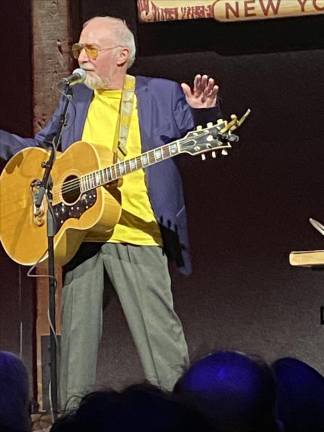Graham Parker is Just Famous Enough in Rare Solo Gig
A recent Jeopardy question involving his band stumped the contestants on the popular ABC-TV game show, but fans who packed City Winery recently for a rare solo performance by the 72 year old rocker sure knew who he is was.

Graham Parker told a funny story on himself a few songs into his terrific set on May 31 at City Winery. While it was refreshingly self-deprecating, it was also revealing.
It seems that one of the questions during the recent Jeopardy Masters Tournament went like this:
“Judd Apatow’s ‘This Is 40’ features a reunion of this fierce British new wave rocker and his legendary band, the Rumour.”
Of course, the answer was none other than “Graham Parker.” But none of the erudite contestants answered correctly. They didn’t even hazard a guess.
Which means that while Parker is famous enough to be the subject of a question on Jeopardy–arguably the pinnacle of pop culture–he was not famous enough for anyone to identify him.
That pretty much sums up Parker’s nearly five-decade career. He is the ultimate cult hero of rock and roll.
And that’s fine with me. Apparently, it’s OK, too, with the people who crowded into City Winery to glimpse a rare solo concert by the 72-year-old Parker. He has been a favorite of serious rock and roll fans since he and his fantastic back-up band, the Rumour, came on to the scene in 1976 with two albums, “Howlin’ Wind” and “Heat Treatment.”
Parker played with great joy and was locked in throughout his 75-minute set. He opened with two early songs, “Fool’s Gold” and “Silly Thing,” before audaciously playing a few cuts from an album of unreleased tunes from before he made his first records. He also performed songs from his upcoming album, “Last Chance to Learn the Twist,” which sounded just fine.
Perplexing Parker
Parker’s fans have been perplexed for many years by his inability to bust through and achieve greater success. And why, by the way, is Graham Parker and The Rumour not in the Rock and Roll Hall of Fame?
He has long possessed one of the great rock and roll singing voices, booming and full of charisma. He has surrounded himself with excellent musicians throughout and he writes witty songs to boot.
So, the obvious question is: Why isn’t Parker a bigger star?
It’s not that Parker’s music could have been called derivative of other highly respected bands. Parker & The Rumour actually debuted before the likes of Elvis Costello, to whom he used to be compared to because of their similar-sounding rock music, The Clash, The Sex Pistols, Dire Straits, The Police and Squeeze.
But Parker’s downfall may have been that he was a victim of some sort of bad luck. He got lost in the shuffle in the late 1970s and early 1980s. Parker himself suspected that suffered from neglect from his record label, Mercury, when he recorded a gem called “Mercury Poisoning.”
He also never really boasted a catchy radio song, such as Costello’s “Alison” or The Clash’s “London Calling” or “Sultans of Swing” by Dire Straits or The Police’s “Roxanne.”
And when Parker did break through in 1979 with the highly praised album “Squeezing Out Sparks”–which was hailed by a Village Voice Pazz and Jop year-end poll as the finest album of the year–he was not able to capitalize on his success.
Unfortunately, Parker and The Rumour parted company in 1980. This turned out to be a turning point of sorts. If Parker and The Rumour had stayed intact and toured incessantly, he may have solidified his hold on the competitive American record-buying market.
Throughout his career, Parker has put an accent on maintaining an uncompromising stance. At City Winery, for instance, he only played one song–“Protection”–from his most famous album, “Squeezing Out Sparks” and shrugged off a request from a fan to play “Temporary Beauty,” a popular song from 1982.
Perversely Parker instead performed an acoustic version of “That’s Life,” a song that Frank Sinatra made famous five decades ago.
Back at City Winery
Back at City Winery, Parker showed no signs of melancholia. He was in good spirits, joking with the audience about his age–kidding at one point that he had been temporarily released by an assisted-living facility so he could play the gig–and making quips about the songs he performed.
City Winery was the ideal venue for Parker on this night. It had the intimate atmosphere of a living room but was large enough to accommodate an audience that showed its appreciation with whoops and ovations. Every soloist should try to play there.
It’s nice to see Parker in such good humor. The first time I saw him in concert was in 1979 in a working-class town on Long Island. That night, he was all adrenaline and too intense to kid around with the audience.
The closest Parker came to cracking a joke in those halcyon days was when he told the throng at The Palladium in lower Manhattan: “I know the title of this next song is complete nonsense when you’re in New York, so do the opposite when I say ‘don’t get excited.” Then he and The Rumour blasted into a song called–you guessed it–“Don’t Get Excited.”
Parker is that lucky person among us who can mellow without losing his edge. You might say he is almost famous–and he is content as he sizes up his long career.
We should all be so lucky.